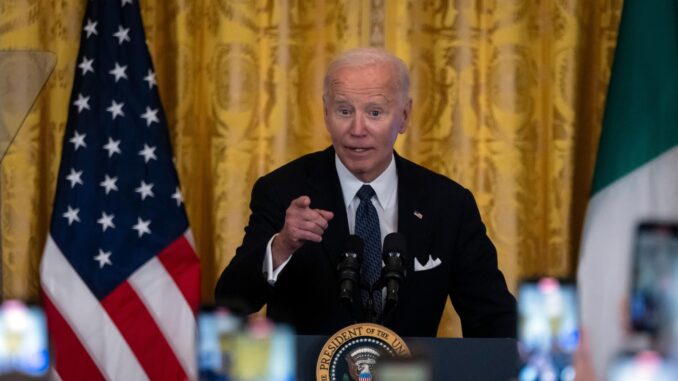
WASHINGTON — President Joe Biden has long believed diplomacy is about personal relationships — and he’ll spend Friday in Berlin with German Chancellor Olaf Scholz as his time in office is on the cusp of ending.
There is also a planned meeting with other leaders in the “European Quad,” a group that in addition to Biden and Scholz includes French President Emmanuel Macron and British Prime Minister Keir Starmer.
White House press secretary Karine Jean-Pierre described Biden as having a “close relationship” with Scholz, who early this year helped broker a multi-country prisoner swap that brought back to the United States the journalist Evan Gershkovich and former Marine Paul Whelan. The German leader told Biden before the deal in words to the effect, “For you, I will do this.”
“We have worked together closely to strengthen our economies for both our people and provide critical support for Ukraine as it continues to defend itself against Russian aggression,” Jean-Pierre said at Wednesday’s White House briefing. “The president really wanted to make sure to go to Germany to thank Chancellor Scholz directly.”
But Biden’s whirlwind trip starting on Thursday is hardly just a social visit.
The United States and Germany have been the largest two sources of aid to Ukraine as it fights to repel a Russian invasion. And with less than three weeks before the U.S. presidential election, Biden also feels obligated to ready allies for the possible return to the White House of Republican Donald Trump, who has antagonized U.S. friends while displaying an appreciation for Russian President Vladimir Putin.
The administration said Biden has no plans while in Europe to meet with Ukrainian President Volodymyr Zelenskyy, but the two spoke on Wednesday about additional military aid, with the White House announcing $425 million in assistance, bringing the total support to more than $64 billion over two and a half years.
In addition to Ukraine, Biden and Scholz plan to discuss European Union relations, democratic values, trade and technology issues, global supply chains, tensions in the Middle East and security issues in the Indo-Pacific region. While in Germany, Biden will also meet with its president, Frank-Walter Steinmeier.
Earlier this month, the U.S. president had delayed a trip planned to Germany and Angola in order to oversee relief efforts ahead of Hurricane Milton making landfall in Florida. He now plans to go to Angola in December.
His trip to Germany comes as Vice President Kamala Harris, the Democratic nominee, has entered an aggressive sprint to persuade and turn out voters in an election that could ultimately determine the future of Biden’s legacy of having strengthened NATO and built up relations in Asia to counter China’s influence.
Trump has questioned America’s commitment to defending NATO allies who are attacked, something that Biden called “un-American” in February.
“The whole world heard it and the worst thing is he means it,” the president said.
Trump has talked about applying tariffs on imports from U.S. allies in Europe and Asia, which could potentially strain relations with countries that could counter Russia, China and other rivals.
“Our allies have taken advantage of us more so than our enemies,” Trump said Tuesday at the Economic Club of Chicago.
Trump declined to say whether he’s continued to speak with Putin since losing the 2020 election but added that it would not be a negative if he and the Russian leader had been in touch. Bob Woodward in his new book “War” reported that Trump and Putin have spoken seven times.
“But I will tell you that if I did, it’s a smart thing,” Trump said. “If I’m friendly with people, if I can have a relationship with people, that’s a good thing and not a bad thing in terms of a country.”


Be the first to comment